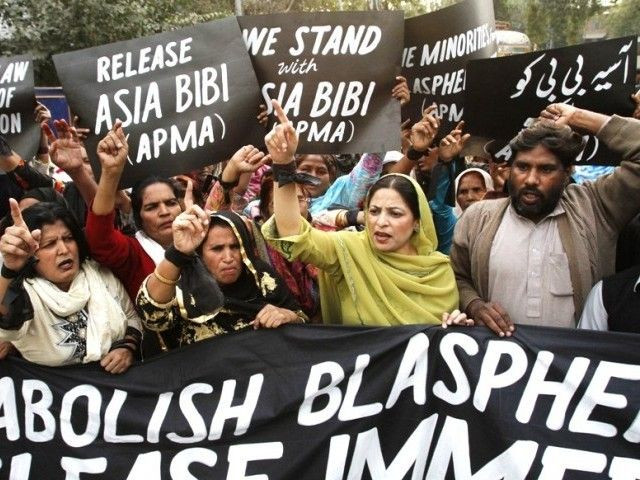A Long Shot In Pakistan: Embattled Christians Seek Separate Province

A new movement in Pakistan is seeking greater autonomy for the country's Christian population, which has faced increasing assaults in recent weeks.
The creation of a new Christian province could help to protect the religious minority, argue proponents -- but their movement is unlikely to succeed.
Younus Masih Bhatti, Pakistan's minister for national harmony, is leading the charge.
"Keeping in view the 2 million Christians in the country and a sense of insecurity among them, there is a requirement for a separate province for them so that they can enjoy equal rights like the majority," he said, according to the Telegraph.
Many Christians in Pakistan feel constrained by the country's strict blasphemy laws, which prohibit a range of religious offenses such as damaging the Quran or insulting Muslim holy figures.
The issue came to a head this month, when a 14-year-old Christian girl set fire to a copy of the Quran. Her defenders claim that she did not commit the crime on purpose, and family members have explained that she is developmentally disabled. Still, the girl was jailed on Aug. 16 and is currently awaiting trial.
A group of Christians in the girl's home city of Islamabad have fled their neighborhood, seeking to avoid retaliatory attacks.
Their fears are not unfounded. A 2009 instance of reported Quran desecration resulted in a vicious anti-Christian attack -- seven people were burned to death in the Punjab.
"This is a very difficult time for Pakistan; there is sectarian violence, there is extremism, there is terrorism," said Bhatti on Thursday, according to Agence France-Presse.
"The people who want to destabilize the country, they can use easy victims. And many times, easy victims are Christians like in this case."
Most of Pakistan's Christians reside in the eastern province of Punjab, which borders India. In general, they tend to live in the province's central districts, as well as urban areas like Lahore and Faisalabad. But they are scattered enough that assigning borders for a new Christian district would be complicated, to say the least.
Many Christians also live outside of the Punjab -- communities can be found in the capital territory of Islamabad, and the southern port city of Karachi.
According to most estimates, Christians make up less than 5 percent of Pakistan's population. (The figure is contested, with some Pakistani Christians claiming that percentage could be much higher.) Hindus form another small minority. The vast majority of Pakistan's population is Muslim, and most are Sunni.
Christianity in the country is mostly a product of British colonialism, which ended 65 years ago. It was Aug. 14, 1947, when Pakistan, carved out of British India, emerged as an independent state.
Concurrent with official independence was Pakistan's split from the Republic of India, a partition based almost entirely on religious differences. The majority Muslim population of Pakistan sought to avoid becoming a minority group under a Hindu-majority government, and so their new country was founded as an Islamic Republic, with laws adhering to the teachings of the Quran.
For many Pakistanis, then, a separate province for Christians would have strong historical parallels. It is the same struggle the country as a whole faced decades ago: a minority religious group seeking more autonomy, for fear of marginalization in the face of an overwhelming majority.
That's not to say the Christian province movement has good odds for success. Pakistan has plenty of problems that are higher on the list of priorities: a weak central government, an administration at odds with the courts over a presidential corruption case, a struggling economy in desperate need of international assistance, sectarian violence, militant groups linked to the Taliban and al Qaeda along the border with Afghanistan, and tensions over U.S. drone strikes, to name a few.
But the Christian demands for greater autonomy do come at an opportune time. Beginning on Tuesday, a new parliamentary commission kicked off meetings to come to a consensus on the creation of new province in Punjab. Bhatti's plea for a Christian province was addressed to this committee.
Then again, the original aims of the committee have little to do with Christians -- it seeks instead to set up a separate province for the Seraiki people, who speak their own language and are mostly Muslims. Further complicating the issue, the Punjabi administration itself, which is run by Pakistan's main opposition party, opposes the creation of a new district that would weaken the province.
In short, creating a Christian province in Pakistan at this point in time would be near-impossible for political reasons. For now, the country's best hope is to promote religious tolerance more in general, but this too is a tall order considering the various religious groups -- Shias, Ahmadis and Hindus -- that are also frequently at odds with majority Sunnis.
"You cannot change this problem in one month or two," said Bhatti on Thusday. "It takes a long time."
© Copyright IBTimes 2024. All rights reserved.






















